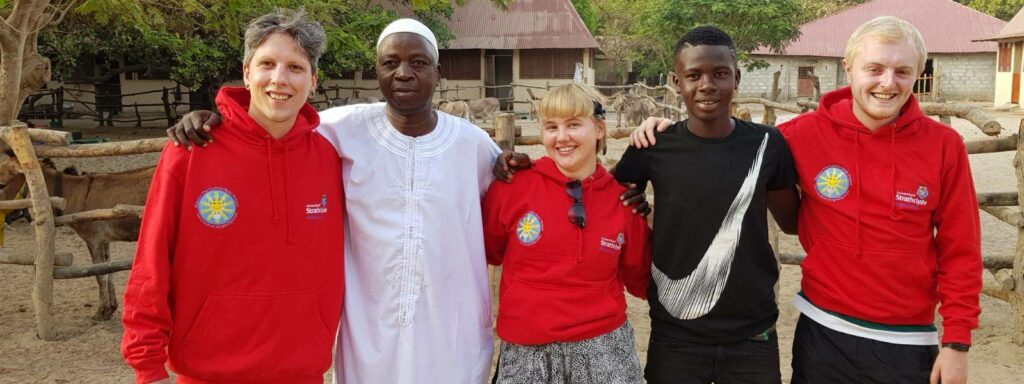
Engineering students from the University of Strathclyde have installed a solar -powered energy system in a school in Kembujeh.
The Kembujeh village school is the twelfth to have benefited from the installation of an off-grid solar photo-voltaic system as part of The Gambia Solar Project since it began in 2006.
To date the solar school systems installed by Strathclyde have helped to improve the educational experience of approximately 5,500 children by providing them with electricity to power lights, fans, mobile phone charging, laptops and TVs.
The Gambia Solar Project forms part of Strathclyde’s ‘Vertically Integrated Projects for Sustainable Development’ programme, which allows students to actively participate in long-term, real-world research challenges associated with the United Nations’ Sustainable Development Goals, while gaining academic credit.
On average, approximately 70-80% of schools across sub-Saharan Africa are without electricity. In The Gambia alone, two thirds of the population live without access to electricity. These people represent just a fraction of the 1 billion people currently living without electricity in the world today.
Working order
The team from the Department of Electronic and Electrical Engineering, led by Dr Scott Strachan and Dr Michael Dolan, and comprising MEng Electrical & Mechanical Engineering undergraduate students Emma Tate, 19, from Inverness, and Callum Taylor, 31, from Luncarty , and Electrical Engineering PhD student Steven Nolan, 25, from Hurlford, spent three very hot days in June completing the most recent installation.
Afterwards they travelled up-country to assess the condition of previous school installations, carry out system repairs and replace batteries to ensure all systems were in full working order.
Emma said: “The people were incredibly grateful for the power that the team installed and described how beneficial it would be. The lighting would allow night classes to be held and the fans would create cooler environments to learn in.”
Callum said: “It’s a strange contradiction – little pieces of technology appear with people taking selfies on mobile phones, playing music from wireless speakers; but they still rely on open fires for cooking food, using candles for lighting and walking long distances to get water from open wells.
“The highlight was seeing the obvious difference electricity was going to make to the school. The whole experience has really reinforced my reason for coming to university to become an engineer – to help people”.
Aja Chargie Jallow, head teacher of the school which has 1,899 pupils, said: “A lack of electricity has caused so many problems in the school.
“It has meant we’ve not been able to store any data, and we’ve lost contact hours with the pupils because it gets dark before the school day ends at 6:30pm, so children and teachers have gone home so we’ve had to close earlier.
“Having electricity has improved teaching and learning in the classrooms. The climate is so hot in the afternoon but having ceiling fans has improved things tremendously.
“We are really grateful to the University of Strathclyde for providing us with electricity and I cannot thank Dr Strachan and the team enough.”
Genuine difference
Team leader, Dr Scott Strachan, said: “Providing electricity for these schools clearly means so much for the children, parents and staff. Ceiling fans can make the classroom climate more bearable; and so provide an environment that’s more conducive for learning.
“Also, providing classroom lighting for evening study, effectively increases the capacity of the school, as class timetables can be redesigned to accommodate more children in the evening and allow safe after-school study zones – as well as offering opportunities for evening classes in basic numeracy and literacy for adults, and acting as a community hub.
“For our students this project is the perfect platform to apply the ‘useful learning’ they acquire at Strathclyde to make a genuine difference to the lives of some of the world’s most vulnerable communities.
Kembujeh village school is the twelfth to have benefited from the installation of an off-grid solar photo-voltaic system as part of The Gambia Solar Project since it began in 2006.
To date the solar school systems installed by Strathclyde have helped to improve the educational experience of approximately 5,500 children by providing them with electricity to power lights, fans, mobile phone charging, laptops and TVs.
The Gambia Solar Project forms part of Strathclyde’s ‘Vertically Integrated Projects for Sustainable Development’ programme, which allows students to actively participate in long-term, real-world research challenges associated with the United Nations’ Sustainable Development Goals, while gaining academic credit.
On average, approximately 70-80% of schools across sub-Saharan Africa are without electricity. In The Gambia alone, two thirds of the population live without access to electricity. These people represent just a fraction of the 1 billion people currently living without electricity in the world today.
Working order
The team from the Department of Electronic and Electrical Engineering, led by Dr Scott Strachan and Dr Michael Dolan, and comprising MEng Electrical & Mechanical Engineering undergraduate students Emma Tate, 19, from Inverness, and Callum Taylor, 31, from Luncarty , and Electrical Engineering PhD student Steven Nolan, 25, from Hurlford, spent three very hot days in June completing the most recent installation.
Afterwards they travelled up-country to assess the condition of previous school installations, carry out system repairs and replace batteries to ensure all systems were in full working order.
Emma said: “The people were incredibly grateful for the power that the team installed and described how beneficial it would be. The lighting would allow night classes to be held and the fans would create cooler environments to learn in.”
Callum said: “It’s a strange contradiction – little pieces of technology appear with people taking selfies on mobile phones, playing music from wireless speakers; but they still rely on open fires for cooking food, using candles for lighting and walking long distances to get water from open wells.
“The highlight was seeing the obvious difference electricity was going to make to the school. The whole experience has really reinforced my reason for coming to university to become an engineer – to help people”.
Aja Chargie Jallow, head teacher of the school which has 1,899 pupils, said: “A lack of electricity has caused so many problems in the school.
“It has meant we’ve not been able to store any data, and we’ve lost contact hours with the pupils because it gets dark before the school day ends at 6:30pm, so children and teachers have gone home so we’ve had to close earlier.
“Having electricity has improved teaching and learning in the classrooms. The climate is so hot in the afternoon but having ceiling fans has improved things tremendously.
“We are really grateful to the University of Strathclyde for providing us with electricity and I cannot thank Dr Strachan and the team enough.”
Genuine difference
Team leader, Dr Scott Strachan, said: “Providing electricity for these schools clearly means so much for the children, parents and staff. Ceiling fans can make the classroom climate more bearable; and so provide an environment that’s more conducive for learning.
“Also, providing classroom lighting for evening study, effectively increases the capacity of the school, as class timetables can be redesigned to accommodate more children in the evening and allow safe after-school study zones – as well as offering opportunities for evening classes in basic numeracy and literacy for adults, and acting as a community hub.
“For our students this project is the perfect platform to apply the ‘useful learning’ they acquire at Strathclyde to make a genuine difference to the lives of some of the world’s most vulnerable communities.
A new initiative, The Gambia Education Project, led by Jane Catlin and Dr Robert Collins, of the School of Education, has recently been created as a complement to the Gambia Solar Project.
This will see staff and students from Education work in tandem with those from the Department of Electronic and Electrical Engineering to provide a greater, more holistic project impact that goes beyond improving the physical learning environment, to improving the whole teacher-student learning experience.
A recent Education-led field trip, which took trainee teachers, Angelica Docherty and Hannah Ross, and School of Government Policy PhD student, Fraser Stewart, to The Gambia, resulted in the formulation of an agreement with the Gambia Teacher Training College to explore opportunities for educational enhancements to current teaching practices – particularly in relation to STEM.
Angelica and Hannah, both agreed that their field trip experience, “had really given them the confidence to believe in the difference they can make in their own classrooms”.
The VIP for Sustainable Development project receives significant funding and support from alumni through the Alumni & Development.
(By University of Strathclyde)










Recent Comments